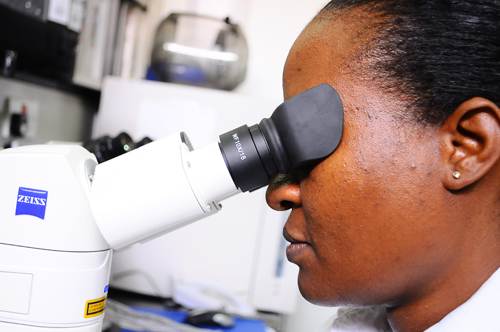In a surprising turn of events, Uganda has found itself in the grip of DNA mania. The implications of paternity tests are reverberating throughout the country, leading to a surge in divorce filings and parents scrambling to update their children’s particulars on national data registers. Prepare for a plot twist like no other!
The Power of DNA: Understanding the Ultimate Instruction Manual
DNA acts as the ultimate instruction manual for our bodies, dictating our functions and shaping our identities. With DNA testing becoming increasingly popular, it seems like everyone, from ordinary citizens to their beloved pets, is hopping on the DNA testing bandwagon. It has become the latest trend!
Rapid Results: DNA Testing Goes “Fast Food”
Gone are the days of waiting anxiously for answers. DNA test results can now be obtained in an astonishingly short span of 3-5 working days! The accessibility of these tests has reached unprecedented levels. By simply collecting a painless and non-invasive swab from the cheek or mouth cavity, individuals can uncover valuable genetic information. Claiming an impressive accuracy rate of 99.5%, these tests promise to reveal hidden family connections and ancestry. 
Consequences Beyond Laughter: The Plight of Innocent Children
Amidst the laughter and revelations, let us not forget the innocent children caught in the storm of DNA testing. Their emotional well-being must be a priority. According to a recent study by the Uganda Child Rights NGO Network (UCRNN), children who discover unexpected paternity results may face psychological distress and a sense of identity crisis. The study further highlights the need for comprehensive support systems to help children cope with these life-altering revelations.
The Government’s Response: Balancing Transparency and Sensitivity
Fortunately, the Ugandan government has recognized the need for regulation and support. Deputy Speaker Thomas Tayebwa summoned Prime Minister Robinah Nabbanja to address the nation and propose measures to curb the skyrocketing number of DNA test applications. The government aims to strike a balance between transparency and sensitivity by ensuring that the process is tightly regulated and that potential psychological impacts on families are addressed.
Proposal for Protection: Paternity Testing as a Restricted Health Service
Recognizing the potential harm caused by DNA-induced revelations, Napak District Woman Representative in parliament, Faith Nakut, has put forth a novel suggestion. She proposes adding paternity testing to the list of restricted health services in order to prevent depression and suicide, particularly among men. This unexpected solution aims to shield families from DNA-induced meltdowns and foster open conversations about paternity concerns with in the family unit.
Impacts Unveiled: 32 Ugandan Men Demand Cancellation of Children’s Passports
Between June 30th and July 5th alone, 32 Ugandan men demanded the cancellation of their children’s passports after receiving paternity test results that shattered their expectations. The fallout from these revelations has thrown a wrench into the family vacation plans of many. Clearly, the DNA saga demonstrates that uncertainty affects not only adults but also the most vulnerable members of society.
Unraveling the DNA Mystery: Frequently Asked Questions
- Who is seeking DNA tests?
The demand for DNA tests is widespread, involving not only couples facing paternity doubts but also individuals curious about their ancestry and potential health risks.
- What are the legal implications of DNA testing?
DNA test results are increasingly being accepted as evidence in legal proceedings, such as inheritance disputes and immigration cases.
- When should one consider a DNA test?
DNA testing is a personal decision that should be made after careful consideration of the potential emotional and legal consequences. It is essential to seek professional counseling before and after undergoing testing.
- Where can one access DNA testing services?
A growing number of private clinics and laboratories offer DNA testing services in major cities across Uganda. However, the lack of comprehensive regulation raises concerns about the quality and ethical practices of some providers.
- Why does the DNA craze matter?
The widespread adoption of DNA testing in Uganda carries significant societal implications. Beyond the curiosity-driven revelations, the emotional and psychological impact on families, especially children, calls for urgent attention and support. 
Seeking Solutions: Balancing Truth Seeking with the Well-being of Innocent Children
As the nation grapples with this DNA dilemma, suggestions abound on how to address the issue. Some propose performing tests at birth to spare the child from future heartbreak, while others argue for skipping the tests altogether due to concerns of manipulation. However, these approaches only scratch the surface of a deeper, systemic issue.
The real challenge lies in fostering open communication within families and society about paternity concerns, while simultaneously providing psychological support to those affected by DNA revelations. Implementing regulations that prioritize the well-being of children, and ensuring the accuracy and reliability of testing services, are critical steps towards mitigating the negative consequences of the DNA mania.
At the end of the day, this story is not just about the curiosity-driven DNA trends or the drama that unfolds in families; it is about the emotional well-being of innocent children caught in the midst of this DNA circus. By highlighting the potential harm caused by unchecked DNA testing and advocating for measures to safeguard the mental health of those affected, we can build a more compassionate and supportive society in Uganda. Ultimately, it is our responsibility to address the DNA mania with sensitivity, ensuring that the pursuit of truth does not come at the expense of our children’s happiness and emotional stability.










